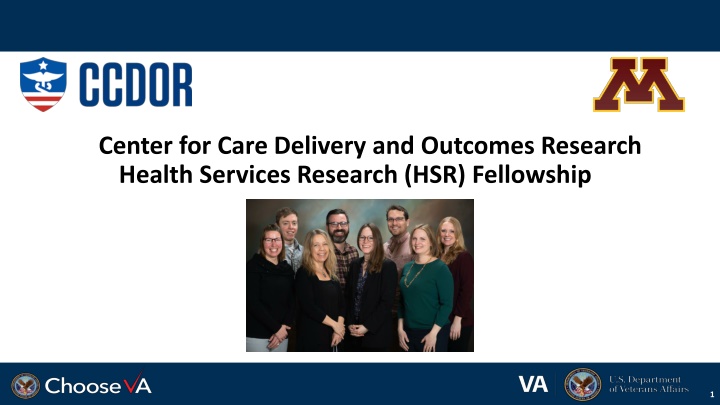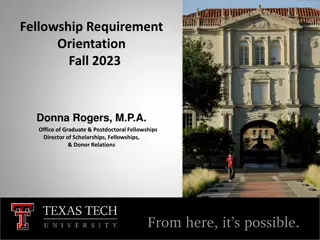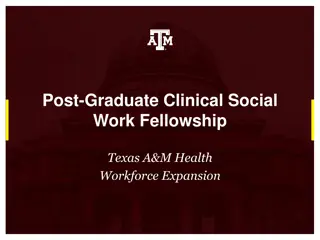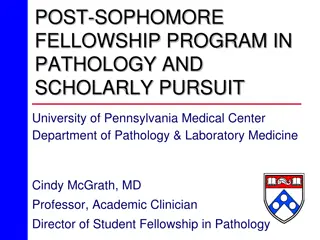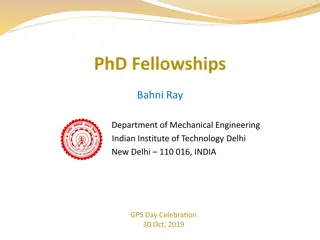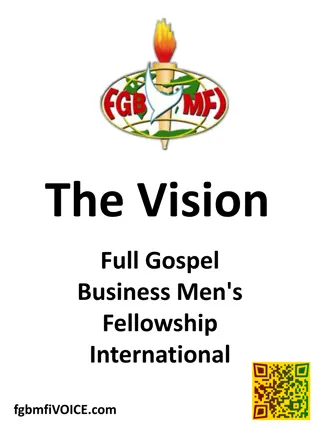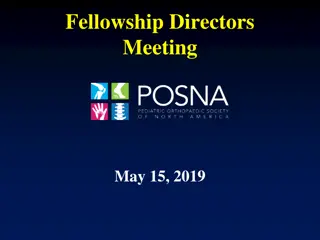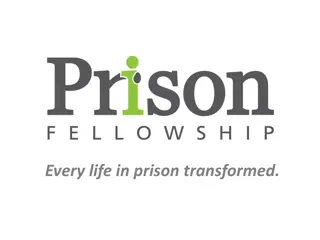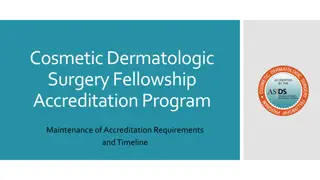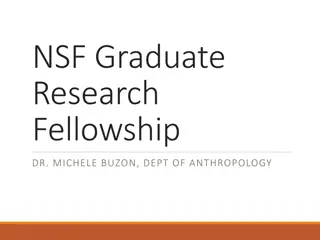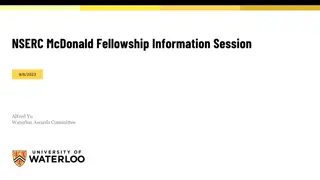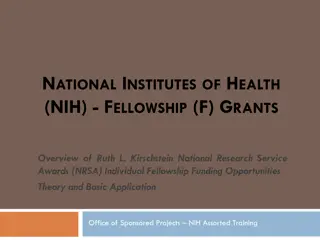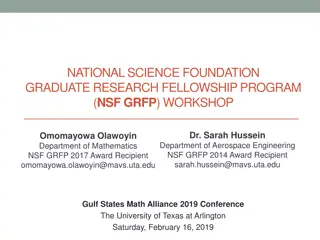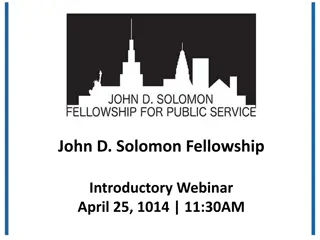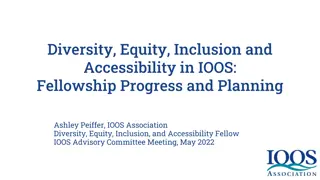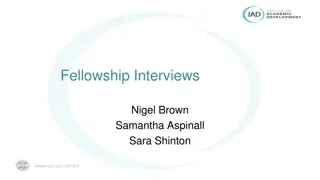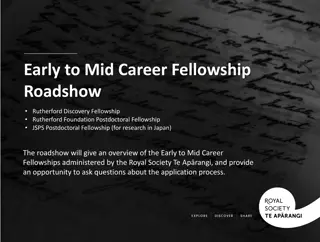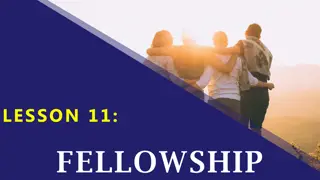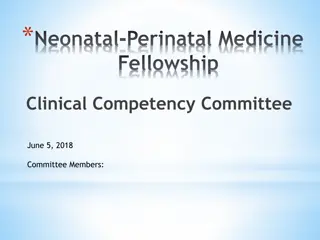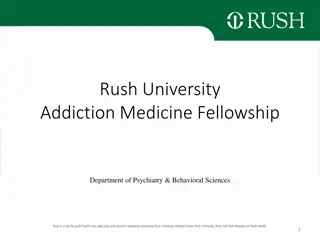Fellowship Program Overview at Center for Care Delivery and Outcomes Research
The Fellowship Program at the Center for Care Delivery and Outcomes Research provides a comprehensive two-year postdoctoral opportunity for individuals in health services research. Fellows engage in research, education, and clinical care, supported by a network of mentors. The program emphasizes Learning Health Systems competencies and offers tailored developmental plans for each fellow.
Download Presentation

Please find below an Image/Link to download the presentation.
The content on the website is provided AS IS for your information and personal use only. It may not be sold, licensed, or shared on other websites without obtaining consent from the author.If you encounter any issues during the download, it is possible that the publisher has removed the file from their server.
You are allowed to download the files provided on this website for personal or commercial use, subject to the condition that they are used lawfully. All files are the property of their respective owners.
The content on the website is provided AS IS for your information and personal use only. It may not be sold, licensed, or shared on other websites without obtaining consent from the author.
E N D
Presentation Transcript
Center for Care Delivery and Outcomes Research (CICenter for Care Delivery and Outcomes Research Health Services Research (HSR) Fellowship Expert & Stakeholder Forum 1
Fellowship Leadership Structure Fellowship Leadership Structure Co-Director Elisheva Danan, MD, MPH Director Diana Burgess, PhD Associate Director Michele Spoont, PhD Associate Director of Curriculum Nathan Shippee, PhD Fellowship Coordinator Brittany Majeski, BA
CCDOR CCDOR- -HSR Fellowship Program HSR Fellowship Program Our HSRD Fellowship was successfully refunded through a competitive recompete in FY21 Two-year postdoctoral fellowship for physicians, associated health or nursing professionals, and those with a PhD or equivalent in health services research, public health, social sciences, or statistics. Fellows spend 80% of their time in research and education and 20% in clinical care (or health care system improvement activities for non-clinicians) at the Minneapolis VA Health Care System. All fellows are paired with a Primary Research Mentor, selected from a talented cadre of CCDOR investigators, and an Operations Mentor. Operations Mentors are clinical or operational leaders who will help fellows address high priority research questions, navigate systems barriers to change, and ultimately conduct more impactful research. 3
Mentoring Mentoring Fellows complete an annual training plan and progress review with their mentors to discuss and refine fellowship goals in the following content areas. Knowledge of priorities of VA operations (e.g., systematic review, understanding IIR priority areas; webinars from operational partners) Study design, execution, and analysis needed to become an independent investigator in target research area. Includes research proposal development such as a LIP. Foundational HSR (health services research) and LHS (Learning Health Systems) competencies; Knowledge in target research area LHS/Experiential learning. Scientific communication (e.g., manuscripts, internal/external presentations, journal reviews). Non-clinical fellows spend 20% of their time in healthcare system improvement activities
Expanded focus on Learning Health Systems Expanded focus on Learning Health Systems MVAHCS & VISN 23 leaders will facilitate opportunities for engagement in high priority LHS & QI research Internal Advisory Board Partnerships with QI & LHS training programs VA Quality Scholars (VAQS) Minnesota Learning Health Systems Career Development Program (MN-LHS) Associate Director for Curriculum, Dr. Nathan Shippee; Director of Curriculum & Methods for MN-LHS Innovative curriculum emphasizingexperiential mentored learning, embedded research & participation in communities of practice Operations Mentor (clinical or operational leader) New learning opportunities through MN-LHS & UMN Center for Learning Health Systems Sciences MN-LHS Design Shop; Applied Topics in Learning Health Systems Research Individualized Development Plan, guided by the Learning Health Systems Competency Appraisal Inventory (LHS-CAI) 5
HSR Fellowship Program Curriculum HSR Fellowship Program Curriculum In FY22, the HSR Fellowship Program expanded their structured curriculum to include the following. The new curriculum is designed to address the core LHS competencies. Required Curriculum Optional Curriculum Fellow Implementation Science Journal Club (started October 2022) Early-Stage Investigator (ESI) Brown Bags Health Services Research Innovations Incubator (HSRI2) seminars Minnesota Learning Health System Mentored Career Development Program (MN-LHS) Design Shop Seminars CCDOR Research Seminars, All Staff Meetings, & Core PI meetings Individual meetings with leads of Evidence Synthesis Program, Veteran Engagement Core, & Fellowship Program Leadership Requirements to present at least one HSRI2 seminar and one Medicine Research Conference/Journal Club Requirement to conduct or observe a Veteran Engagement Panel Minneapolis VA Medicine Research Conferences/Journal Club Research Service Conferences Medicine Grand Rounds University of Minnesota Center for Learning Health Systems Sciences (CLHSS) Impact Monthly Seminars Program in Health Disparities Research (PHDR) Seminars Center For Chronic Disease Reduction And Equity Promotion Across Minnesota (C2DREAM) seminars T32 Cancer Health Disparities Training program activities 6
HSR Fellowship Program Curriculum continued HSR Fellowship Program Curriculum continued Local Curriculum Learning Objectives LHS Researcher Core Competency Domains Example Fellow Training Opportunities CCDOR Research and Infrastructure Core Mentoring and Training Core; Implementation Core Applied Topics in Learning Health System Research course at UMN SPH Participation in ESP evidence review or GRADE (Grading of Recommendations Assessment, Development and Evaluation) project Systems Science Research questions, and standards of scientific evidence Evidence Synthesis Core Statistics & Data Management (SDM) Core; Evidence Synthesis Core Research methods MN-LHS Design Shop Seminar Partner with Clinical Informatics fellows to co- manage a project embedded in VA Operations (connect with Adams Dudley) Mentored experience seeking IRB or regulatory oversight for pilot project; Fellow/ESI Lunchtime Seminars; Informatics Statistics & Data Management (SDM) Core Ethics of research and implementation in health systems Improvement and Implementation Science Mentoring and Training Core Implementation Core Implementation Core Implementation Science Journal Club participation Veteran Engagement (ViEW) Core; Implementation Core; Mentoring and Training Core CCDOR DEI Workgroup Engagement, leadership, and research management Preparing and participating in ViEW panel for a study; Fellow/ESI Lunchtime Seminars Diversity, Equity, and Inclusion Program for Health Disparities Research seminar series; Health Equity Workgroup activities 7
Internal Advisory Board (IAB) Internal Advisory Board (IAB) Multi-disciplinary operational leaders from the MVAHCS, senior LHS leaders and fellowship faculty IAB Chair: Burgess Help fellows become embedded in LHS research and QI initiatives at the MVAHCS, for research (80% time for all fellows) and healthcare system improvement initiatives (20% time for non- clinical fellows) Provide oversight of the program and curriculum Annual evaluation report will include fellow and faculty evaluations 9
IAB Members IAB Members Areef Ishani, MD, Medical Director for the VISN 23 Specialty Care ICC and Director, MVHAHCS Primary Care and Specialty Care ICC Kristin Nichol, MD, MPH, MBA, Deputy Chief of Staff, MVHAHCS Timothy Beebe, PhD, Director of MN-LHS, Deputy Director UMN Center for Learning Health Systems Sciences (CLHSS) R. Adams Dudley, MD, MBA, CCDOR Investigator; Professor of Medicine, Informatics, and Public Health Hildi Hagedorn, PhD, CCDOR Investigator, 2020 VA HSR&D Health System Impact Award and an internationally recognized leader in implementation science Shahnaz Sultan MD, MHSc, UMN Department of Medicine s Vice Chair for Diversity, Equity, and Inclusion Genevieve Melton-Meaux, MD, PhD, Director of the UMN CLHSS 10
Embedded Research & Communities of Practice Opportunities Embedded Research & Communities of Practice Opportunities Facility and ICC leadership will help identify high priority QI and LHS projects and will connect fellows with Operations Mentors and leaders in the Quality, Safety, and Value (QSV) office Affiliation with other VA training programs: VA Quality Scholars (VAQS) VAQS has close relationships with the QSV Office, facility executive leadership, and ICC Chiefs Geriatric Research, Education, and Clinical Center (GRECC) Clinical Informatics Fellowship (CIF; Joint MVAHCS and Hennepin Healthcare fellowship) HSR Fellows may co-manage a project embedded in VA operations with CIF Affiliation with non-VA communities of practice: UMN NIH Clinical and Translational Science Institute (CTSI) Minnesota Learning Health System Mentored Career Development Program (MN-LHS) The UMN Center for Learning Health Systems Sciences (CLHSS) Participate in the Minnesota Electronic Health Record Consortium (MN-EHRC) 11
